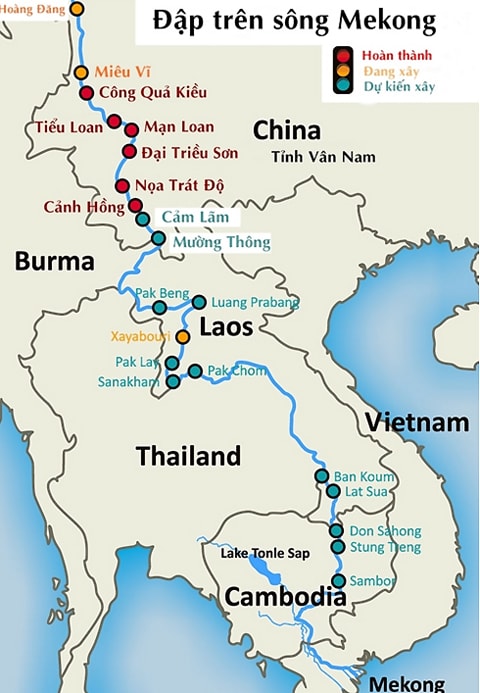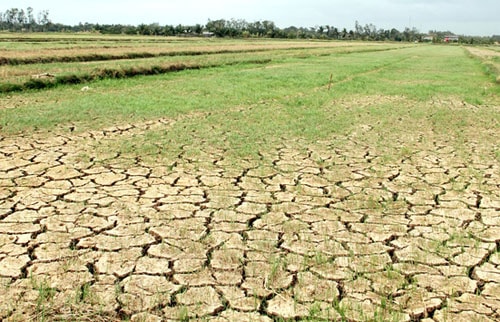Mixed reactions as China announces water release
While people and leaders of the Mekong Delta provinces are happily waiting for water from China, irrigation experts say they should not hope too much because the water will be almost completely blocked before reaching Vietnam.
In response to China's announcement that it will release water from a dam in Yunnan province to the lower Mekong River until April 10 to help alleviate the drought in Southeast Asia, including Vietnam, local agricultural leaders and many irrigation experts have had mixed reactions.
Local people and leaders happily wait for fresh water
Mr. Luong Ngoc Lan, Director of the Department of Agriculture and Rural Development of Bac Lieu, said that Bac Lieu in particular and the Mekong Delta in general benefit greatly when China releases emergency water into the lower Mekong River.
“If China releases water on March 15, fresh water from the Hau River to Bac Lieu through the Quan Lo Phung Hiep canal will be available in the next four days. We have put all irrigation systems adjacent to Soc Trang province in a state of readiness, and will open the sluices to receive fresh water,” said Mr. Lan.
According to Director Lan, Bac Lieu province is located at the end of the Hau River, severe drought in recent months has caused the amount of fresh water in the area to dry up, saltwater has penetrated deep into the canals. Currently, saltwater has not penetrated into the fields, but it is forecasted that in the near future if there is no additional fresh water, saltwater will attack, causing great damage to agriculture.
In Soc Trang, Mr. Huynh Ngoc Van, Deputy Director of the Department of Agriculture and Rural Development of the province, said that fresh water is brought from the Hau River through the Long Phu - Tiep Nhut irrigation system; the Quan Lo Phung Hiep area; the system in Ke Sach district... All of these irrigation systems are ready to open the sluices to receive the water.
“We have directed relevant units to widely notify people across the province as soon as they receive fresh water so that farmers can proactively get water into their fields and limit damage,” said Mr. Van.
Currently, the area of spring-summer rice in Soc Trang suffering from drought is 47,000 hectares, sugarcane is 1,200 hectares in Cu Lao Dung district. If there is fresh water in the next few days, the damaged area, estimated at 30 to 70%, will be significantly reduced.
Hearing the news that China was releasing water, old farmer Pham Minh Hung, residing in Doan Van To hamlet, Dai An 1 commune (Cu Lao Dung, Soc Trang) happily said: "We are happier than finding gold. If there is fresh water, the 300 hectares of sugarcane land of the people in the district will be saved."
 |
| Experts are concerned that the water flowing from China to other countries will be very little when it reaches Vietnam. Graphics: Michael Buckley |
Only 3-4% of water from China reaches the Mekong Delta
Contrary to the joyful attitude of the people and leaders of the arid region, Dr. To Van Truong, former Director of the Southern Institute of Water Resources Planning, said that China is not a member of the 1995 Mekong Agreement (MRC), so it is very difficult for the downstream countries to have a legal basis to request this country to release water. Even if China agrees to release water downstream, along the way through Thailand, Laos and Cambodia, which are experiencing drought, water will be taken through a system of sewers and pumping stations.
"Therefore, the amount of water released from China's lake to Bien Ho will be absorbed almost completely according to the natural regulation law, leaving only about 3-4% of the water reaching the Mekong Delta," Dr. Truong said, adding that Vietnam needs to request China to share and provide information in advance about the annual operating plan at some hydropower plants.
Dr. Tran Anh Tuan, Deputy Director of the Institute for Climate Change Research (Can Tho University) also said that Thailand, Laos, and Cambodia are facing serious drought, especially Thailand is trying to bring water from the Mekong River, so when water from China flows down through these countries, they will take advantage of it and very little will reach Vietnam.
"Current water collection only supports domestic purposes, but cannot save agricultural land," said Mr. Tuan.
In response to concerns from irrigation experts, Minister of Agriculture and Rural Development Cao Duc Phat said that experts have calculated and have technical specifications for the Ministry of Foreign Affairs, the Ministry of Agriculture and the Ministry of Natural Resources to request China to balance the discharge flow at the reservoir. If China does so, the record drought in the Mekong Delta will be resolved, and the countries in the basin will also escape drought.
According to the representative of the General Department of Irrigation, China's agreement to help Vietnam is a sign of goodwill. The water release will also help somewhat in the current drought situation.
 |
| Drought and saltwater intrusion in the Mekong Delta have caused great damage to the economy and people's lives. Photo: Cuu Long. |
According to the Ministry of Agriculture, due to the impact of saltwater intrusion, many economic sectors and people's lives in 10/13 provinces and cities in the region have been seriously affected. The total damaged rice area since the end of 2015 is nearly 160,000 hectares; 155,000 households (575,000 people) are short of water; many schools, clinics, hotels, and factories have no fresh water.
According to VNE

